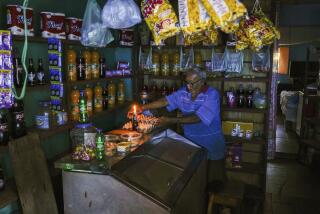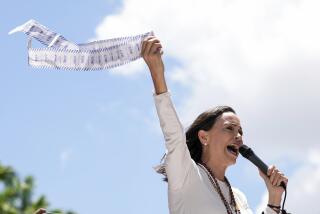Venezuelans protest censorship of popular TV channel
- Share via
Reporting from Caracas, Venezuela, and Quito, Ecuador -- Protests broke out in Venezuela on Monday after cable companies dropped transmission of a popular channel that the government declared had broken telecommunications laws by not broadcasting President Hugo Chavez’s speeches.
Government critics and supporters of Radio Caracas Television took to the streets of Caracas, the capital, and several other cities after companies dropped RCTV’s programming under threat of losing their licenses.
Meanwhile, Vice President and Defense Minister Ramon Carrizalez and his wife, Environment Minister Yubiri Ortega, announced their resignations, insisting that they were quitting for strictly personal reasonsunrelated to the RCTV turmoil. Gen. Carlos Mata Figueroa was named the new defense minister.
Venezuelan police and national guard troops fired tear gas and plastic bullets to disperse thousands of protesters. Security forces tried to block a march by university students headed for the government telecommunications agency Conatel.
Students from four Caracas universities blocked traffic, causing transportation snarls. Protests were also reported in Merida, Valencia and Ciudad Guayana.
Four marchers protesting the RCTV ban were reportedly injured in the port city of Maracaibo after a Chavez supporter drove his car into a rally. The driver was arrested.
Also on Monday, Venezuela’s Roman Catholic Episcopal Conference declared the ban on RCTV antidemocratic.
Once Venezuela’s top-rated broadcaster and a major producer of soap operas and talk shows, RCTV lost its license to use the airwaves in 2007; Chavez accused RCTV of having supported a 2002 coup attempt and of subversive activities. The station’s owners denied the accusations, saying they were being punished for criticizing Chavez’s socialist policies.
The station fired half of its 3,000 employees and managed to survive with programming delivered by cable companies.
The disappearance of RCTV from cable menus Sunday morning provoked a storm of international protests from critics who said Chavez was attacking freedom of expression.
A telecommunications law passed last year requires cable companies to conform to the same rules as broadcast channels, including requirements that Chavez speeches be shown. RCTV did not show an appearance by the president at a political rally Saturday.
On his regular television show “Alo Presidente” on Sunday, Chavez said RCTV had been notified numerous times to observe the law but did not respond. “There are some bourgeois who give themselves the luxury of challenging the government. It’s their decision, not ours,” Chavez said.
RCTV President Marcel Granier said Chavez had changed the law to enable his government to suppress subscription programmers as it had broadcasters.
Organization of American States Secretary-General Jose Miguel Insulza said the group’s human rights commission had written a letter of protest and offered to mediate a solution. The French government urged Chavez to observe informational pluralism.
Mogollon and Kraul are special correspondents.
More to Read
Sign up for Essential California
The most important California stories and recommendations in your inbox every morning.
You may occasionally receive promotional content from the Los Angeles Times.










